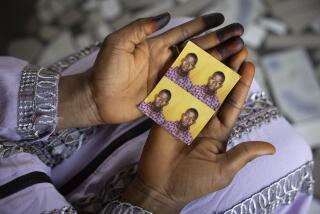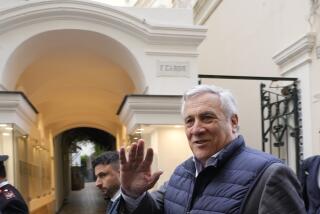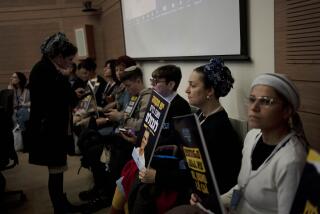Foreigners Held in Iraq Living in Tense Limbo
- Share via
BAGHDAD, Iraq — For the Western and Japanese hostages in Iraq, the angular, sand-colored profile of the Mansour Melia Hotel is the most sinister feature of the Baghdad skyline.
To be detained and taken to the Mansour Melia is usually a fateful step toward forced transformation into a “human shield” that President Saddam Hussein figures will deter attack. At the hotel, hostages rounded up in Kuwait and Iraq are processed and sent out to military and industrial sites across the country.
For hostages not yet turned into human shields, the Mansour Melia is to be avoided. Just how is a question that gnaws at their minds and morale.
Some have gone into hiding to escape detention. Others have taken refuge in their embassies in Iraq and Kuwait. Still others, laboring under contract for the Iraqi government, continue to work in the hope of avoiding becoming a “guest,” in the official euphemism.
Many hostages exist in a sort of limbo, not confined but not free. But all of them--the clandestine, the cooperative, the refuge seekers--face the common problem of how to act, what to say, where to go, in order to stay out of a worse situation.
For each, it is a difficult issue of personal choice, one that involves principle, self-interest, fear and social pressure. The judgments are as varied as the nationalities and backgrounds of the hostages. Meanwhile, their hopes are limited by events far beyond their control, far beyond the lobby of the dreaded Mansour Melia.
About 30 Americans are holed up in U.S. diplomatic residences in Baghdad, taking advantage of the diplomatic immunity that is still in effect.
In some places, they have organized themselves by chore: Someone cleans the floor, someone else the pool; someone acts as presenter of nightly video movies. There is a spokesman who talks with reporters. Almost everyone reads a lot to pass the time.
Three refuge takers, interviewed separately, all emphasized the need for solidarity, although none claimed to speak for the entire group. They supported the pressure Washington is putting on Iraq to abandon Kuwait, and they were reluctant to put the interests of the hostages at the center of public debate in the United States.
Roland Bergheer, a construction expert, went further than his colleagues in trying to separate the hostage question from U.S. policy. Bergheer, 62, a former merchant mariner who was born in Germany and whose brother lives in Southern California, argued that at a time of possible war, “one has to consider oneself expendable.”
Like his compatriots, he has experienced mood swings brought on by separation from family and friends.
“I’m down when I think about not being able to see my kids and grandchildren,” he said. “I’m up when I think that maybe this can’t last too much longer.”
But as far as Bergheer is concerned, the question is out of his hands.
“I believe in my commander in chief,” he said. “What he decides, I’m with.”
For a traveler from Europe headed halfway across the world to Australia, a flight that leaves on time is usually a blessing. But on Aug. 2, when Andrew Peake’s British Airways flight bound for India left London on time and landed on schedule in Kuwait, at 4 a.m., punctuality became a curse.
Peake, who is an Australian social worker, and scores of other passengers were hustled out of the airport and moved from hotel to hotel until, on Aug. 31, he and other Westerners ended up at the Mansour Melia.
After a few days, Peake was released. British and French passengers were kept and presumably sent off to join the human shield program. Peake, 41, now spends his days at Baghdad’s Sheraton Hotel as a guest of British Airways.
“I am perhaps the longest-running transit passenger in the world,” he quipped.
Peake believes he owes his relative freedom to Australia’s status as a “gray” country among the Western opponents of Saddam Hussein. Citizens of the “black” countries--the United States, Britain, France and West Germany--seem to be most vulnerable to roundup and banishment to potential military targets.
Peake thinks his government should give priority to getting the handful of Australian hostages out of Iraq and Kuwait and back home. He is at odds with Australia’s decision to contribute ships to the American-led naval blockade of Iraq. Australia, he said, should think first of Australians.
“We are always fighting someone else’s war,” he complained, recalling Australian participation in the Vietnam conflict. “Uncle Sam wiggles his finger, and we come running.”
Peake is aware that his comments might be viewed as self-serving, and he is careful to make them only to Australian and other Western reporters.
If the Iraqis should ask him to repeat the comments on Iraqi television, he would balk, he said, and added:
“It’s one thing to express my opinion to Australians, but another to Iraq. People back home would say I’m selling out. I would be a social pariah when I got home. My attitude would not be any different if I was in Australia, but I’m not.”
Across the street from the Sheraton stands the Palestine Hotel, another brownish building faced with a curious pattern of spider-web window screens.
Recently five British engineers were sitting in a bar off the lobby sipping beer after a day’s work. They are under contract to the Iraqi government. Under Hussein’s rules for Westerners, contract workers are not to be taken hostage, and their immunity has led them to be reticent around reporters.
“We are treated well,” one said. “We have no problems. Sure, we are concerned about our countrymen, but why add to the load? We are here for business, not politics. If we stop working, we will be in the same boat with the hostages. What purpose would that serve?
“It’s better not to talk. This is not England. Our government has not forbidden us to work. They don’t want any more hostages either. It’s just better to keep on. You can understand that, I think.”
The scene at the Italian Cultural Center the other day resembled nothing so much as a town meeting. The 30 Italian men gathered there were debating points of principle and action in the excited tones common to their homeland.
But this was not Florence or Bologna, and the subject of debate was not a sewer project left undone by the commune. The men were talking about their fate as hostages.
They were construction engineers and electrical technicians who oversaw major building projects in Iraq, oil men who helped modernize Iraqi refineries, businessmen brought up from Kuwait who had built a lucrative trade in everything from marble to electronics. They had come from Milan, Sicily, Sardinia--and they all had strong opinions.
“It is Iraq that is responsible, and we should talk to Iraq,” one said.
“We’re not here to write letters to Italy,” another interjected.
“No, Italy must stand up for us,” said another. “If you don’t want to take a decision, go back to the hotel, to the pool, eat and sleep and forget.”
Ten men walked out.
The remaining men considered a written statement that sought to cover everyone’s concerns. It condemned the Iraqi invasion of Kuwait, asked the Italian government to consider the hostage issue when making decisions and announced their intention to demonstrate in Baghdad, passports in hand, to press for freedom.
They voted on the statement and approved it, although it was not entirely clear who was to read it, or to whom, or when.
No matter. A day later, a leftist Italian politician who supported Iraq’s invasion arranged for 10 of them to leave. They were supposed to be Italians who were ill but--some of the Italians said--a few who were quite healthy, including a couple of businessmen who had led the meeting, got on the flight. A few who were indeed ill were overlooked.
The statement was sent to no one, and there was no demonstration.
Now, in the evenings, you can see some of the Italians strolling along the river, within sight of the Mansour Melia, trying to catch a rare cooling breeze off the water.
More to Read
Sign up for Essential California
The most important California stories and recommendations in your inbox every morning.
You may occasionally receive promotional content from the Los Angeles Times.












